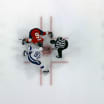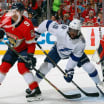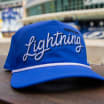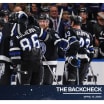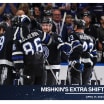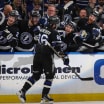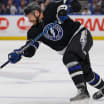Mishkin's Musings: 5 thoughts on Marty and the Bolts
Lightning broadcaster Dave Mishkin writes on Marty's big night and the Bolts upcoming road trip
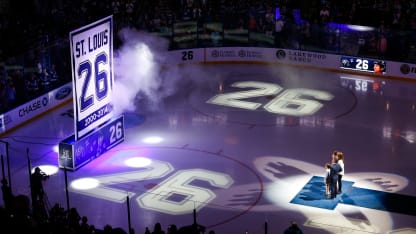
© Mark LoMoglio
- It's fitting that the jersey retirement ceremony for Marty St. Louis, who played every game with such heart, was so heartfelt. It put into wonderful perspective Marty's inspirational journey from a part-time NHLer to the superstar he became. It also effectively captured the impact Marty had on both the Lightning - and the league as a whole. Best of all, of course, was Marty's speech. It hit all the right notes. He expressed his appreciation for everyone who helped him in his journey. He showed his sense of humor, so well known to his teammates, but not a side that was on display during games. Then there was the part of his speech about his late mom. I can't believe there was a dry eye in the arena (my eyes certainly weren't).
In all, the event was incredibly well done. Personally, I feel fortunate to have been there to witness it.
2. Marty's legendary work ethic and career numbers are well documented. Another part of his legacy was his capacity to produce big plays when the stakes were high.
Here on the Lightning's website
, we counted down the Top Ten "Marty Moments" in the days leading up to Friday's ceremony. I was asked to come up with a list. My top six Marty Moments all occurred in the playoffs.
Marty stopped by our radio booth during the first intermission and I asked him how he was able to be at his absolute best when the stakes were at their highest. He smiled and replied simply, "I was always an emotional player" and therefore able to thrive in the pressure-cooker atmosphere of the NHL playoffs.
3. It's a little early for Hall of Fame talk, because he's not yet eligible. But in my opinion, he should be a lock to get in. (I also feel Dave Andreychuk, who holds the NHL record for most power play goals scored, netted over 600 goals and played over 1,600 games, should also be in. But that's a column for another day). By any standard, Marty meets the criteria. He produced goals, assists and points consistently throughout his career. He played over 1,100 games, even though he didn't become a full-time NHLer until he was 25. As mentioned earlier, he was a clutch playoff performer. He's a Stanley Cup Champion, as well as a winner of the Art Ross Trophy (scoring title- twice), Hart Trophy (League MVP), Lester Pearson Award (league's outstanding player as voted by fellow players) and Lady Byng (gentlemanly conduct - three times).
Marty is quick to point out that he owes much to his teammates and linemates. During our intermission interview, he mentioned the three centermen with whom he played the most during his career: Brad Richards, Vinny Lecavalier and Steven Stamkos. He pointed out that one is a Conn Smythe Winner (Playoff MVP - Richards) and the other two won the Rocket Richard Trophy (Goal scoring champion - Lecavalier and Stamkos). But those players would be just as quick to point out that they owe much to St. Louis. During his career, he consistently made those around him better. That's another mark of a Hall-of-Famer.
If those elements aren't enough to get him in, here's one more. And this, in my opinion, is the deal-closer. Marty St. Louis was a transformational player. He fundamentally helped change the game. When Marty turned pro in 1997, undersized players didn't have a role in the NHL. There were rare exceptions, like Theo Fleury, but most players Marty's size didn't make it. Not only did they not make it, they often weren't even given a chance to make it.
Marty's ascension came at a time prior to the crackdown on obstruction. In those days, bigger players had more freedom to grab, hold or hook opponents, effectively slowing them down. The fact that Marty excelled in that era is a testament to his determination and heart.
His ability to succeed not only served as an inspiration to other smaller players, it opened the eyes of General Managers. After Marty St. Louis became an impact player in the NHL, GMs weren't so quick to dismiss potential prospects previously deemed "too small". Of course, the league's rule changes in 2005 regarding obstruction also created opportunities for speedy players under 6'0". But Marty St. Louis was the first one to open doors and change the way teams were constructed. If that doesn't make him Hall-Of-Fame worthy, I don't know what does.
4. Now back to the present-day Lightning, who ended up dropping Friday's game vs Columbus, 3-1. That defeat came the night after their 4-2 win over Buffalo, a triumph that ended a four-game losing streak. Despite the defeat to Columbus, the Lightning, for the second straight night, shored up some of the problem areas that plagued them during the four-game skid. While neither game this past week was perfect, their team defense was tighter, puck management cleaner and compete level higher. That combination helped them defeat Buffalo, but it wasn't enough versus Columbus. In Friday's game, isolated mistakes were costly, goalie Joonas Korpisalo was terrific for the Blue Jackets and the Lightning had bad puck luck (three goal posts hit and an unlucky bounce on Columbus' first goal).
Generally speaking, if the Lightning can replicate their performances this past week moving forward, they'll give themselves a good chance to get points every night. Sometimes, a team can play well enough to earn at least one point, but isn't rewarded. That's hockey. And that's what happened Friday
But as
I wrote in my Extra Shift column after Friday's game
, here's the issue for the Lightning. Their struggles over the past two months have erased any wriggle-room they might have had to absorb those types of games. At this point, it's not enough to play well enough and swallow a regulation loss. They need points - and they need them badly.
5. Clearly, if the Lightning are going to scramble their way up the standings, they're going to have to go on a big run. So what does the rest of the season look like for the Lightning? The six-game trip that begins Monday in Los Angeles is a difficult one, but it's the team's final long trip of the season. After this one ends, the Bolts have five sets of two-game trips (they are all back-to-backs) and one three-game swing in the final week of the regular season. So while back-to-backs can be tough, the trips aren't lengthy, meaning that the team will be at home a lot in the regular season's final two and a half months.
What about their opponents? The Bolts have 38 games remaining. Seventeen will be played against the Western Conference and they'll have sixteen more within the Atlantic Division. Only five games are left versus the Metropolitan. The Lightning's record against the West so far this year has been abysmal - they've posted just two wins in 11 games. They must improve that record in their final 17 contests versus the West. They'll get a chance in the next five games to do just that.
Against the Atlantic, on the other hand, the Bolts are 9-3-2 this year. Maintaining that solid mark would not only improve their overall record, it would also help them move up the Atlantic division standings.

